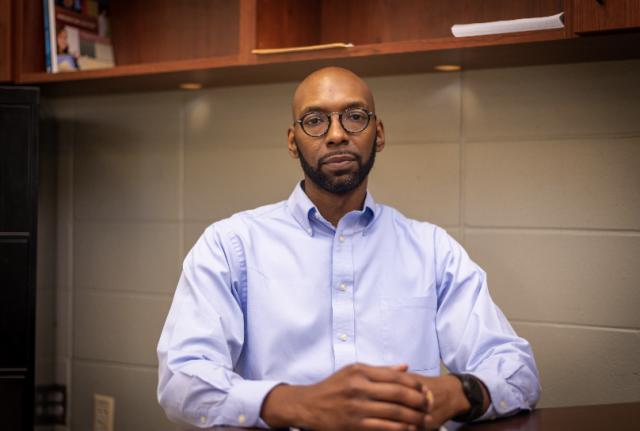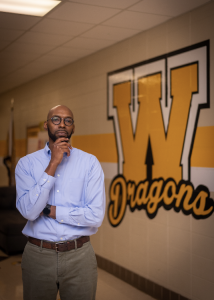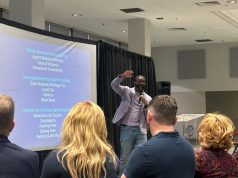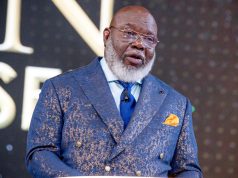
By Ryan Michaels
The Birmingham Times
Many in the Birmingham area are hurting and Alabama Regional Medical Services (ARMS) behavioral therapist Calvin Thomas would know.
Thomas is a social worker who works with students throughout Birmingham City Schools from his office at Wenonah High School in SW Birmingham. In addition to Wenonah, ARMS has six school-based health centers (SBHCs).
This month, a 17-year-old was killed April 1 at an east Birmingham apartment complex and a 28-year-old man was shot to death by a Jefferson County sheriff’s deputy outside the Collegeville public housing community.
In the first three months of 2023, there had been 74 people shot who survived those injuries. That number was up from 70 for the same time period in 2022. However, homicides in the City of Birmingham dropped double digits in the first quarter of 2023, according to AL.com’s Carol Robinson.
In his role as a therapist, Thomas works with both children and adults who are grieving gun violence deaths and other issues they face daily. A large part of his approach is ensuring that therapy is a safe place.
“I really try to focus on safety and letting them know that I’m here for them. It is not about me. It’s really about them having that space to process and to be who they are to try to wrap their minds and their hearts around the situation,” Thomas said.
The hurt comes in a number of ways “whether that’s because they feel life is unfair, or they feel that they’re just trying to do better about things in their life, and they’re just unsure how to handle it,” Thomas said.
“Unfortunately, sometimes the pain we feel, we end up taking that out on others that don’t deserve it, so I feel that one of the reasons that things are becoming worse is just that we’re becoming less connected.”
There no longer seems to be a sense of community and many seem to be isolated, which can be a problem, Thomas said. Many in Birmingham and across the country feel secluded and that feeling has been intensified increasingly by toxic politics, as well as the [previous] COVID pandemic, he said.

Some, in their isolation, feel unwanted by others and that can lead to violence, Thomas said.
“Sometimes that killing is towards another person, and sometimes that killing is also towards themselves taking their own life . . .,” he said.
“I believe the more we connect as a community, the more people feel that, ‘Oh, I can go to my neighbor, or I can go to my family member,’ this person or that person, to receive what I need in order to just empower myself, then instead of like taking life, then you want to give life.”
The city is at a point now where “if we want to see more progress, if we want to see just better results, there has to be that sacrifice, that willingness to serve beyond just ourselves,” he said. “[I understand] it’s not always easy to make time for other people because sometimes we’re so focused on our own little niche and family that it just seems like that’s all the time I have, but . . . “we can’t do it by ourselves.”
“We have to connect with each other and collaborate in order for it to really produce some great benefits that are good for everyone, regardless of social class, and regardless of ethnicity and race, regardless of education level, all of that.”
“We have to work together to try to address the barriers and it’s going to take more. It’s going to take leaders in the faith, it’s going to take leaders in civics, it’s going to take education, businesses, things we’ve heard before, but we just have to continue on,” he added.
In addition to stronger connections between community members, Thomas said it’s also necessary to make a stronger effort to educate people on responsible gun ownership. Policymakers should also think about how to restrict gun access for youth, Thomas said.
“You really want to limit that with young people. With adults, it becomes a little more difficult, because you have that right to use guns, but at the same time, trying to figure out how do we do this in a way to look out for each other where we don’t have mass shootings, or we’re not being in compromising situations,” Thomas said.
He encouraged parents to make gun violence prevention a priority.
“Parents, we really have to come together and find out what are we willing to do to give up this, for the good of all…At the end of the day, if this is really about trying to save life, then we have to be able to give up something that we want for the good of seeing young people live beyond 16 and 18,” Thomas said.
“Take [it] seriously when it looks like something is going on with a young person, but we’re not sure what it is,” Thomas said. “Even if you’re unsure, just to be willing to say, ‘Hey I’m not trying to be nosy. I just want to say it seems like something’s different. Are you okay?’”
Young people can feel when people really show them care, Thomas said.
“Sometimes, we feel like we don’t have the right words, but a lot of times, it’s just our presence. Teenagers, they just feel when somebody really cares about them. They’re more willing to open up if they feel like the person will take a little bit of time for them,” Thomas said.
— BOX —
Resources for young people grieving gun violence deaths or need access to therapists who can provide assistance or help.
Crisis Center Birmingham, (205) 323-7777
National Suicide Hotline, 988
The Amelia Center, (205) 638-7481




